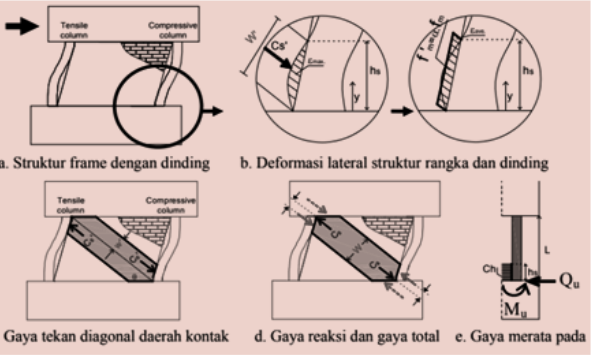Analisis Kapasitas Seismik Gedung Eksisting Beton Bertulang Dengan Dinding Bata
DOI:
https://doi.org/10.25077/jbkd.2.2.71-79.2024Keywords:
Kapasitas seismik, Daktilitas, Gedung beton bertulang, Indeks seismik dasar, Kekuatan lateralAbstract
West Sumatra is one of the provinces in Indonesia with an area that is very prone to earthquakes that can cause damage and even collapse reinforced concrete buildings. Therefore, an evaluation of the seismic capacity of buildings in West Sumatra was conducted. The purpose of this study was to evaluate the seismic capacity of the FMIPA Lecture Building, Padang State University by taking into account the influence of brick walls. The evaluation was guided by the Japanese standard, Standard for Seismic Evaluation of Existing Reinforced Concrete Building, 2001, using the level two method. The evaluation was carried out only on the first floor where the greatest shear force occurs in the building structure with calculations in two directions, namely the East and North directions. The seismic capacity is expressed by the basic seismic index value of the building, E0 which is obtained from the relationship between lateral strength and structural ductility. As a result, the basic seismic index value for the North direction is 0.48 with a lateral strength index of 0.49 and a ductility index of 1.0. In the East direction the basic seismic index value is 0.38 with a lateral strength index of 0.41 and a ductility index of 0.92. So the FMIPA Lecture Building, Padang State University has sufficient seismic capacity to withstand an earthquake.
Downloads
References
Bothara, J., Beetham, D., Brunsdon, D., Stannard, M., Brown, R., Hyland, C., Lewis, W., Miller, S., Sanders, R., & Sulistio, Y. (2010). General observations of effects of the 30th September 2009 Padang earthquake, Indonesia. Bulletin of the New Zealand Society for Earthquake Engineering, 43(3), 143.
Chaker, A. A., & Cherifati, A. (1999). Influence of masonry infill panels on the vibration and stiffness characteristics of R/C frame buildings. Earthquake Engineering & Structural Dynamics, 28(9), 1061–1065. https://doi.org/10.1002/(SICI)1096-9845(199909)28:9<1061::AID-EQE856>3.0.CO;2-3
Indonesia, S. N. (2019). SNI 1726: 2019 “Tata Cara Perencanaan Ketahanan Gempa Untuk Struktur Bangunan Gedung dan Nongedung.” BSN, Jakarta, Indonesia.
Leilany, L. (2022). ANALISA KAPASITAS SEISMIK DENGAN DAN TANPA DINDING BATA PADA GEDUNG BETON BERTULANG. JURNAL RIVET, 2(01), 53–61.
Maidiawati, & Agus. (2016). Metoda Evaluasi Kapasitas Seismik Gedung Beton Bertulang Eksisting dengan Aplikasi Model Dinding Bata. Jurnal Teknik Sipil ITB, 23(1), 19–30.
Maidiawati, & Sanada, Y. (2008). Investigation and analysis of buildings damaged during the September 2007 Sumatra, Indonesia earthquakes. Journal of Asian Architecture and Building Engineering, 7(2), 371–378.
Maidiawati, & Witjaya, S. (2015). EVALUASI KAPASITAS SEISMIK BANGUNAN BETON BERTULANG EKSISTING DI KOTA PADANG DENGAN MEMPERHITUNGKAN PENGARUH DINDING BATA. JURNAL TEKNIK SIPIL ITP, 2(1).
Priestley, M. J. N., Verma, R., & Xiao, Y. (1994). Seismic shear strength of reinforced concrete columns. Journal of Structural Engineering, 120(8), 2310–2329.
SANADA, Y. (2013). MODELING OF BRICK MASONRY INFILL AND APPLICATION TO ANALYSES OF INDONESIAN R/C FRAME BUILDINGS. Proceedings of the Thirteenth East Asia-Pacific Conference on Structural Engineering and Construction (EASEC-13), I–1.
The Japan Building Disaster Prevention Association (JBDPA). (2005). English Version, 1st, Standard for seismic evaluation of existing reinforced concrete buildings, 2001.

Downloads
Published
How to Cite
Issue
Section
License
Copyright (c) 2024 Dinda Lestari, Maidawati Maidawati, Muhammad Ridwan

This work is licensed under a Creative Commons Attribution-NonCommercial 4.0 International License.
Jurnal Bangunan: Konstruksi & Desain (JBKD) is licensed under CC BY-NC 4.0



